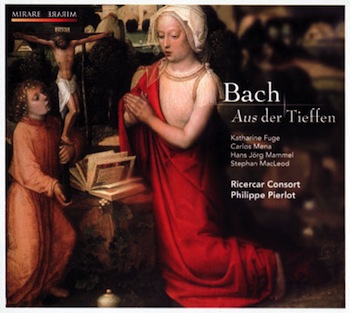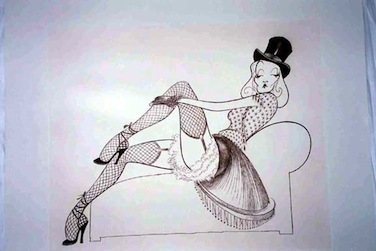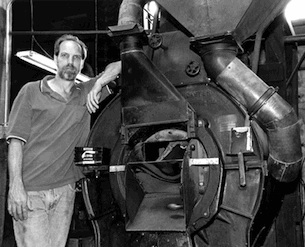LETTERS FROM THE GLOBAL PROVINCE
Coffee Moments, Global Province Letter, 2 March 2011
"Black as the devil, hot as hell, pure as an angel, sweet as love."
----Charles Maurice de Talleyrand (1754-1838)
J.S. Bach’s Coffee Cantata—The Libretto.
JS Bach's
Coffee Cantata
Libretto by
Christian Friedrich Henrici
Cantata BMV211
![]() wav:229Kb
wav:229Kb
Composed for performance by Bach's Collegium at Zimmerman's Coffee House,
Leipzig, between 1732 & 1734
![]()
Recitative Narrator Be quiet, stop chattering, and pay attention to what's taking place: here comes Herr Schlendrian with his daughter Lieschen; he's growling like a honey bear. Hear for yourselves, what she has done to him! Aria Schlendrian
Don't one's children cause one
endless trials & tribulations!
What I say each day
to my daughter Lieschen
falls on stony ground.
Recitative
Schlendrian You wicked child, you disobedient girl,
oh! when will I get my way;
give up coffee!
Lieschen Father, don't be so severe!
If I can't drink
my bowl of coffee three times daily,
then in my torment I will shrivel up
like a piece of roast goat.
Aria Lieschen Mm! how sweet the coffee tastes, more delicious than a thousand kisses, mellower than muscatel wine. Coffee, coffee I must have, and if someone wishes to give me a treat, ah, then pour me out some coffee! Recitative Schlendrian If you don't give up drinking coffee
then you shan't go to any wedding feast,
nor go out walking.
oh! when will I get my way;
give up coffee!
Lieschen Oh well!
Just leave me my coffee!
Schlendrian Now I've got the little minx!
I won't get you a whalebone skirt
in the latest fashion.
Lieschen I can easily live with that. Schlendrian You're not to stand at the window
and watch people pass by!
Lieschen That as well, only I beg of you,
leave me my coffee!
Schlendrian Furthermore, you shan't be getting
any silver or gold ribbon
for your bonnet from me!
Lieschen Yes, yes! only leave me to my pleasure! Schlendrian You disobedient Lieschen you,
so you go along with it all!
Aria Schlendrian Hard-hearted girls
are not so easily won over.
Yet if one finds their weak spot,
ah! then one comes away successful.
Recitative
Schlendrian Now take heed what your father says! Lieschen In everything but the coffee. Schlendrian Well then, you'll have to resign yourself
to never taking a husband.
Lieschen Oh yes! Father, a husband! Schlendrian I swear it won't happen. Lieschen Until I can forgo coffee?
From now on, coffee, remain forever untouched!
Father, listen, I won't drink any
Schlendrian Then you shall have a husband at last! Aria Lieschen Today even dear father, see to it! Oh, a husband! Really, that suits me splendidly! If it could only happen soon that at last, before I go to bed, instead of coffee I were to get a proper lover! Recitative Narrator Old Schlendrian goes off to see if he can find a husband forthwith for his daughter Lieschen; but Leischen secretly lets it be known: no suitor is to come to my house unless he promises me, and it is also written into the marriage contract, that I will be permitted to make myself coffee whenever I want. Trio A cat won't stop from catching mice, and maidens remain faithful to their coffee. The mother holds her coffee dear, the grandmother drank it also, who can thus rebuke the daughters! |
The Perfect Cup of Coffee. It’s a miracle that a celebrant ever has a perfect cup of coffee. The beans must be good: much of the coffee that pours in from the branded, heavyweight producer countries is dreck. Some of the best coffee in the world is found in regions ignored by both the media and and the expensive coffee and tea purveyors. From Veracruz and the mountains of western Mexico comes topflight coffee, but few know this, since Mexico’s agricultural distribution and marketing mechanism suffers from clogged arteries and other co-morbidities..
Then too, the brewer or the barista must be both patient and precise. The server must lay it out on the bar top or put it on one’s table with some quiet finesse. The waiters of Tiro a Segno or Joe’s in New York’s Greenwich Village might go next door back in the 1970s to fetch espresso from Caffé Dante when it was at its peak under a chap from Lucca, a town also known for its olive oil. White jacketed, bearing small circular white trays, they had a verve that improved as they dashed between the café and their customers. We learned the barista art from John Bell, a painstaking fellow who hung for a while with Neal Cassady.
And the café must be populated by a gentle set of people, either given to low-key conversation or diverse reading. No din. No hurry. A lone flute of a visiting minstrel might softly punctuate the air. Such a coffee house, dedicated to the perfect cup and fragrant conversation, wonderfully encapsulates the attributes of a civilized society that rejects mediocrity and animosity.
Three Long Gone. Dante today is much different, cluttered and irksome. But in its day, one could use it as a digestif, with both express and fernet to settle one’s insides. Julia, the owner’s sister-in-law, would tell us, “I went overseas today.” That is, she went to Staten Island. A couple of other places had such magic, but not many.
In the early sixties, a soldier at Fort Ord would put on his civvies and go off to the Sancho Panza in Monterey, situated in the The Gutierrez Adobe, built in 1841. Of an evening Joan Baez would perform, perhaps in skirt and blouse, back when she was a rather shy folk artist who had not yet met Bob Dylan. One might have a snack as well in the courtyard behind the house. Fate did put an end to this Sancho Panza, but the owners named Gabriel arose from the ashes later in San Francisco.
 Never to be forgotten is the Coffee Cantata on Polk Street in San Francisco. Low comfortable furniture put one at ease. Luscious pastries were as enticing as the coffee drinks. But, of course, the owners also greeted guests with Vivaldi and other light classicists. More than once, one imbibed to Bach’s Coffee Cantata. Unfortunately the owners eventually had a disagreement: later iterations with different proprietors on Union Street had none of the charm of the original.
Never to be forgotten is the Coffee Cantata on Polk Street in San Francisco. Low comfortable furniture put one at ease. Luscious pastries were as enticing as the coffee drinks. But, of course, the owners also greeted guests with Vivaldi and other light classicists. More than once, one imbibed to Bach’s Coffee Cantata. Unfortunately the owners eventually had a disagreement: later iterations with different proprietors on Union Street had none of the charm of the original.
We suspect that magical coffee houses all have too short a life. Oft as not, they have quiet locations in modestly Bohemian sections of cities here and there about the globe. They are about conversation and coffee, newspapers and books: they are a superior Internet, as thinks the Economist, without any technological trappings. There one sees commerce and romance and unlikely novels cooked up. Notebook computers and cell phones are not allowed. The music is not canned, but is carefully picked by the proprietor. DVDs, and boxes of candy, and coffee mugs, and other schlock are not part of their offering. The coffee habitat is an escape into contentment.
The Sadness of Starbucks and the Counter Reformation. The coffee antichrist of our age is the chain Starbucks. Generally the product is neither bad nor good—just mediocre. Its best locations are at franchises such as grocery stores where the personnel are often cheerier, the tables are not jammed, and the drinks usually are better. The Starbucks goliath has put some single proprietors out of business, with the result that many citizens here and abroad may never have the experience of better coffee and better conversation and elegant community. The ghastly concoction that saved Starbucks, when its business got in trouble, was the frappuccino This drink has further debased the whole brand, and put light years between it and the grand coffee houses of the past both here and abroad. It has multiplied coffee drinkers but driven out the coffee experience.
But there are counter tendencies afoot which suggest that quality may not be dead.
For instance, Oliver Strand tells us in “Coffee’s Slow Dance” that the Japanese, passionate coffee drinkers, have climbed Mount Fuji and provided drip coffee equipment that leads to a much superior cup:
One of the most important coffee markets in the world, Japan imports more than 930 million pounds of it each year — more than France, less than Italy. It’s not a fad. There are coffee shops in Japan that date to at least the 1940s and traditions that reach back even further; it’s a culture that prizes brewed coffee over espresso (although that’s changing) and clarity over body. Coffee is as Japanese as baseball and beer
One adopter — and importer — of Japanese gear was James Freeman of Blue Bottle Coffee in Oakland, San Francisco and now Brooklyn. Freeman and his wife, the pastry chef Caitlin Williams Freeman, recounted a visit to Chatei Hatou, a Tokyo coffee shop where brewing coffee isn’t exactly a ceremony but is ceremonious. They said beans were weighed, ground, emptied into a filter and preinfused with a little bit of water that let the coffee bloom and release carbon dioxide. Cups and saucers were warmed; a slice of chiffon cake was set in the fridge to firm up. Only then was the coffee brewed, slowly.
“They’re going for a mastery of technique, then a mastery over all the important details of service,” Freeman said. “It adds up to an incredibly elusive experience. It’s hard to manufacture splendidness. It seems as though they have something very difficult figured out.”
As importantly, some realize that a superior cup of coffee also very much depends on the atmospherics. Virginia Heffernan, in “Table Disservice,” suggests “you’re welcome to linger in a café, as long as your reading material isn’t battery powered” in some demanding coffee houses. Ms. Heffernan, hardly a coffee esthete, herself comes down in the end for all the electronic paraphernalia, but we are happy to see that some discriminating proprietors are banning all the junk. Just as we think Danny Meyer of Union Square café fame could claim that his signal professional accomplishment is to ban cell phones from his eateries.
The consummate coffee house tells us what business in all the developed countries of the world must do to survive the onslaught of wares from developing nations. Every firm must become a boutique providing supreme quality, conspicuously good service, and, above all, a unique experience. In the post-mass-market world, the proprietor must hasten to provide one-of-a-kind, locally grounded, pleasantly humane encounters. This is the sort of ether that surrounds all high craft enterprises.
Coffee Music. Since coffee done right is an adult pleasure that Mayor Bloomberg and other health fanatics have not banned from our lives, we are heartened that it is so celebrated in song. The list is endless, and some devotee should gather up all the coffee chords in an archive. One friend reminds us of “The Java Jive” as remembered by the Inkspots: it seems to remind one of America’s innocence when we could sing about the simplest little things in our lives.
 But our favorite is “You’re the Cream in My Coffee” done with Marlene Dietrich’s flourish. Marlene tells us that her singing of it earned her a part in the Blue Angel.
But our favorite is “You’re the Cream in My Coffee” done with Marlene Dietrich’s flourish. Marlene tells us that her singing of it earned her a part in the Blue Angel.
The coffee experience is a sophisticated pastime that is available to the common man, much like Marlene.
P.S. Here is a coffee song list to get you enthused.
P.P.S. An elderly Greek gentleman in San Francisco once waxed at length about the coffee house he once owned in Philadelphia. He had founded it just after he came to the United States. It was only years later that we learned that his ‘coffee house’ was a house of ill repute and that gentlemen had a cup coming and going when they were not using the other services of the house. We wonder if the cat houses that tight-lipped Senator Reid is trying to abolish in Nevada offer a cup of coffee.
P.P.P.S. Our detective friend David Fechheimer swears by some coffee houses both on the East Side of New York and in San Francisco. We have never gotten around to trying any of his choices. But we have never really had a superb cup of Joe or espresso above 14th Street.
 P.P.P.P.S. Perhaps 20 years ago we spied a woman taking some goods out of a woodie (i.e., wooden station wagon) in the French Quarter. Turned out she was the proprietor of a unique coffee roaster in New Orleans named Try Me. Some people drink No Lead. But if you do want High Test Coffee, you should try her chicory blend which is Jim Dandy.
P.P.P.P.S. Perhaps 20 years ago we spied a woman taking some goods out of a woodie (i.e., wooden station wagon) in the French Quarter. Turned out she was the proprietor of a unique coffee roaster in New Orleans named Try Me. Some people drink No Lead. But if you do want High Test Coffee, you should try her chicory blend which is Jim Dandy.
P.P.P.P.P.S. Suze Rotolo, an earlier girl friend (1961-1963) than Joan Baez, and a muse to Bob Dylan who much broadened his scope, died February 25, 2011. “Ms. Rotolo spent most of her adult life pursuing a career as an artist and avoiding questions about her three-year affair with Mr. Dylan.” (New York Times, March 1, 2011, p.B14). As Dylan might have said about her, “She's an artist, she don't look back.”
Home - About This Site - Contact Us
Copyright 2011 GlobalProvince.com